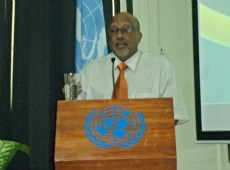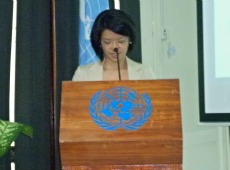President Dr Mohamed Waheed’s Gaumee Ithihaad Party (GIP) has claimed voters will shun the country’s two largest political parties during September’s elections in favour of the “national stability” offered by a coalition representing the current government.
The comments were made as discussions continued this week between the GIP and the leaders of three other government-aligned parties in order to outline the direction of a recently formed coalition that will back President Waheed in the upcoming elections. The president’s party has maintained that the coalition backing Waheed was not expected to deviate much from the policies of the current government.
Earlier this week, the government-aligned Dhivehi Rayyithunge Party (DRP) announced it would be joining the religious conservative Adhaalath Party and the Dhivehi Qaumee Party (DQP) in a coalition backing President Waheed’s re-election. The DRP is the largest party in terms of MP numbers to so far back President Waheed, whose own GIP party currently has no political representation in parliament.
However, former Maldives President and founder of the government-aligned Progressive Party of Maldives (PPM) Maumoon Abdul Gayoom today told local media that Dr Waheed’s coalition presented no threat to the election bid of its own candidate MP Abdulla Yameen.
The PPM – the country’s second largest party in terms of number of MPs – back in March elected MP Yameen to stand as its presidential candidate and has continued to reject calls to join a coalition against the opposition Maldivian Democratic Party ahead of the elections. Yameen is Gayoom’s half brother.
Stabilisation measures
GIP Spokesperson Abbas Adil Riza told Minivan News today that he believed the country’s voters were “quite happy” with the stabilisation measures taken by President Waheed’s current coalition government. He added therefore that it was his belief the electorate would favour ensuring the stability of the nation by backing the president and his supporters rather than supporting the MDP or PPM.
Asked whether the president’s coalition would be able to win the election against the MDP and PPM, respectively the majority and minority leaders in parliament, Riza claimed national support was dwindling for the two parties.
“Even at its peak, the MDP could not get more than 25 percent of the vote,” he said. “The PPM on the other hand is backed by supporters of [former President] Maumoon Abdul Gayoom, not Yameen. The majority of [PPM supporters] favour joining the coalition.
Abbas added that the coalition had yet to choose a candidate to stand as President Waheed’s running mate, although discussions between leaders of the PPM, DQP and the Adhaalath Party were continuing today.
“I’m not aware of what these decisions are about, but all three parties have shown they agree on one thing – their support for President Waheed,” he said.
Abbas added that after agreeing to back the president, it would be “easy” for the coalition to outline a combined manifesto ahead of the elections due to their experience of working together – along with the PPM and MP Gasim Ibrahim’s Jumhoree Party (JP) – in the current government since the controversial transfer of power on February 7, 2012.
“These parties are already working in a coalition with this government and have been setting the national agenda for the last two years,” he said. “In terms of policy, I don’t think we will see a significant deviation from the economic policies and development programs we have already seen. People care more about the stability of a nation than any political party.”
Responding to Riza’s comments, the PPM today questioned the political strength of the three party’s currently backing President’s Waheed, while also dismissing the effectiveness of coalitions in the Maldives dating to the country’s first multi-party elections in 2008.
PPM MP Ahmed Nihan said that even if the president continued to extend his coalition to all other political parties in the country, the elections will remain a contest between the rival ideologies of former President Mohamed Nasheed -represnted by the MDP – and former President Gayoom – represented by the PPM.
“Just 48 hours ago we concluded a meeting in Addu Atoll, one of the largest areas in the country outside of Male’. Given the numbers of people we met there, it is clear there are only two parties,” he said.
Nihan added that while the PPM would continue to support President Waheed as part of the present coalition government up to September’s elections, it would not be looking to join any coalition ahead of voting.
“Originally in the first round of the 2008 elections, former President Gayoom failed to obtain enough votes to get re-elected. As we know, Nashed then formed a coalition to win the election in the second round,” he said. “What we saw then was after 20 days, JP Leader Gasim Ibrahim resigned without much reason from the government. This has put a big question mark over the strength of coalitions.”
Nihan added that DQP Leader Dr Hassan Saeed, the present Special Advisor to President Waheed, has previously expressed “unconditional support” for the MDP and Nasheed following the 2008 presidential elections. Yet he noted that the DQP, under Dr Saeed, went on to become one of the most vocal opponents of the Nasheed administration.
Nihan claimed that as a result of the country’s previous experience of coalition government, he believed there would be little appetite among voters for a power sharing government ahead of September’s vote.
MDP candidate former President Nasheed has also declared his party has ruled out forming a coalition during the elections, criticising the effectiveness of power sharing in Maldivian politics.

